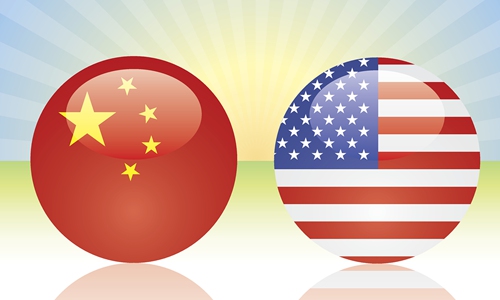HOME >> OPINION
Trump will think carefully before using Hong Kong bill against China in the future
By Song Xiaofeng Source:Global Times Published: 2019/12/2 20:28:40

Photo: VCG
On Wednesday, the last workday before Thanksgiving, US President Donald Trump signed on the dotted line of "Hong Kong Human Rights and Democracy Act," which officially put the bill into effect. Radical protesters in Hong Kong were thrilled by it, yet Trump's true intention in signing the bill is not about promoting the so-called democracy and freedom in the city, but about considerations of US domestic politics and the upcoming presidential election.The China-US relationship has entered a new period, in which competition between the two is becoming increasingly fiercer.
Taking a hard-line approach toward China is already considered political correctness in US politics - the House of Representative's unanimous approval of the act and the only one vote against it in US Senate is ample proof of this.
Under the circumstance, if Trump did not sign the bill, he would have to face criticism from Democrats and mainstream media, which could have led to an internal division among the Republicans. Besides, Trump is still caught up in the impeachment inquiry. Saying no to the act would have further weakened his position in the presidential election. Even if Trump did not give the Hong Kong bill a nod, the act would have automatically taken effect on Tuesday.
On another note, Trump is pushing forward a phase one trade deal with China, since economic performance during his presidency is crucial for his future presidential campaign. Signing the Hong Kong bill will definitely make it harder for a trade deal to be reached between Washington and Beijing. This is a trade-off that Trump is fully aware of, and this is also why he suggested in his statement that relevant clauses might not take effect immediately, noting "my administration will treat each of the provisions of the act consistently with the president's constitutional authorities with respect to foreign relations."
Trump intends to not only leave some room for maneuver in the US-China trade deal, but also to add another chip in the negotiations. Whether China likes it or not, the US-China trade deal now has the Hong Kong issue as a string attached to it.
The "Hong Kong Human Rights and Democracy Act" represents blatant US interference in China's internal affairs. The US is known for its long-arm jurisdiction. Creating domestic laws is one of Washington's old tricks to bring down opponents.
As a matter of fact, since US policymakers raised the idea of the act, it has, to some extent, started to wield its influence, which can be figured out if anyone combines the US law-making process with the ups and downs of the situation in Hong Kong. However, the key issue is how this act will work later. Bills to suppress opponents are always part of the US diplomatic arsenal. The US has many China-related bills, but when and how to use them depends on what the US needs.
For the moment, Washington has several cards to play against Beijing - the trade war and Hong Kong card are the two that are most potent now. The US deliberately launched the trade war and availed itself of the opportunity to stir up trouble concerning Hong Kong affairs. The trade war is closely connected with China's economy and people's living standard. Although Hong Kong is still trapped in chaos, it has not yet put China's sovereignty and government in danger.
However, these two things have become entwined, thanks to Trump's signing of the bill, and can no longer be addressed separately. In addition, Taiwan is gearing up for its "presidential" election next year, which will complicate the situation further.
Faced with the waves of tricky problems, China should deal with them at its own pace. It is crucial to find the connection between different problems.
But most importantly, the relationship between resolving relevant issues and maintaining overall strategic stability should be made clear. After that, the corresponding plans need to be made. By doing so, China can safeguard its bottom line in this complex situation without being caught in dilemma.
The author is secretary-general and researcher of Taihe Institute. opinion@globaltimes.com.cn
Posted in: VIEWPOINT